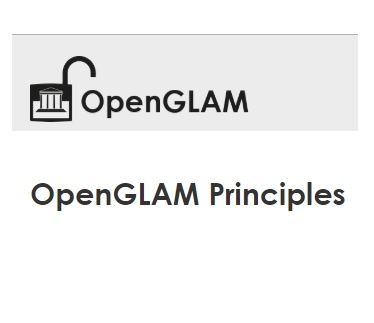Join OpenGLAM & Help review shared principles for Open Galleries, Libraries, Archives & Museums
16/10/2018


(Image: OpenGLAM network)
In 2018 community members from Wikimedia, Open Knowledge International and Creative Commons reinvigorated the OpenGLAM initiative.
OpenGLAM is...
... a global network of people and organizations who are working to OPEN up content and data held by Galleries, Libraries, Archives and Museums. As a community of practice, OpenGLAM incorporates ongoing efforts to disseminate knowledge and culture through open policies and practices that encourage broad communities of participation, and integrates them with the needs and activities of professional communities working at GLAM institutions.
When we say that digital content or data is OPEN...
... we mean that it complies with the Open Definition, which can be summed up in the statement that:
“A piece of data or content is open if anyone is free to use, reuse, and redistribute it — subject only, at most, to the requirement to give credit to the author and/or making any resulting work available under the same terms as the original work.”
The first step to make a collection open is to apply an open license, but that is where the story begins. Openness to collaboration and to novel forms of user engagement are essential if cultural heritage institutions are to realise the full potential of the internet for access, innovation and digital scholarship.
|
1. Release digital information about the artefacts (metadata) into the public domain using an appropriate legal tool such as the Creative Commons Zero Waiver. |
|
2. Keep digital representations of works for which copyright has expired (public domain) in the public domain by not adding new rights to them. |
|
3. When publishing data make an explicit and robust statement of your wishes and expectations with respect to share/reuse of data and repurposing of the descriptions, the whole data collection, and subsets of the collection. |
|
4. When publishing data use open file formats which are machine-readable. |
|
5. Opportunities to engage audiences in novel ways to manage/use data should be pursued. |
Open GLAM Principles
Since their publication in 2013, the Open GLAM Principles have offered a declaration of intention to build a community of practice which helps GLAMs share their collections with the world.
In the last years, the OpenGLAM community has become more global, adopted more tactics and strategies for integrating openness into institutions. But do the principles reflect this change?
|
To find out, all interested parties are invited to fill in a survey about the utility of the principles. We want to understand from the broader community:
The survey will run until 16th November. Your participation is greatly appreciated! |
To get involved with the Open GLAM working group and community, you can:
- Join GLAM through [email protected]
- Join the OpenGLAM mailing list
- Take a look at and join @openglam twitter account: the GLAM community invites different parts of the world to showcase and highlight the way in which “OpenGLAM” is being understood in different contexts. So far, the Twitter account has had contributors from Africa, Asia, Latin America, the Middle East, North America & Europe. Anyone can become a contributor or suggest someone to contribute by signing up through this form. If you want to see the content that has been shared through the account, you can check the oa.glam tag in the Open Access Tracking Project.
.jpg) Related:
Related:
- GODAN Donor Open Data Policy and Practice : comparing Open Data Policies and putting Common Policy into practice
- IDW2018: African Open Science Platform Session on Skills-development in an increasingly data-driven science environment: an African perspective
- Implement effective Open Data & Keep it alive with Open Data TOOLKIT
- Want to take WIPO's General e-Course on Intellectual Property? Enroll here – it’s free of charge
- Towards meeting the Directory of Open Access Journals (DOAJ) quality criteria in the global South
.jpg)
To keep up-to-date with AIMS news, please, Sign up for AIMS News, follow @AIMS_Community on Twitter.
And, thanks again for your interest !
